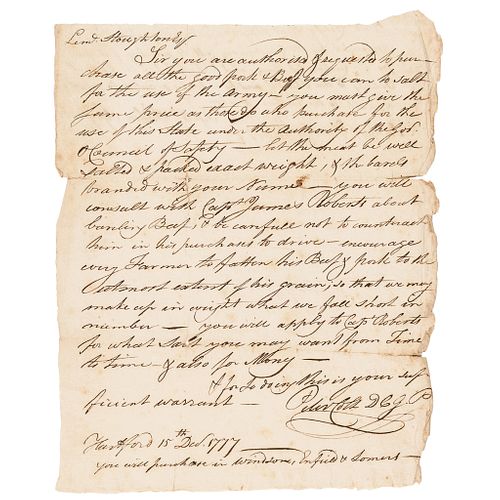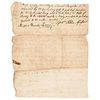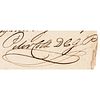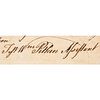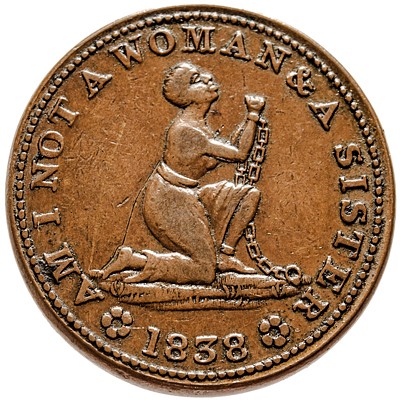December 15th, 1777 Continental Army Connecticut to Purchase Revolutionary War Provisions
Lot 271
Categories
Estimate:
$2,400 - $3,200
Absentee vs Live bid
Two ways to bid:
- Leave a max absentee bid and the platform will bid on your behalf up to your maximum bid during the live auction.
- Bid live during the auction and your bids will be submitted real-time to the auctioneer.
Bid Increments
| Price | Bid Increment |
|---|---|
| $0 | $10 |
| $200 | $20 |
| $300 | $25 |
| $500 | $50 |
| $1,000 | $100 |
| $2,000 | $200 |
| $3,000 | $250 |
| $5,000 | $500 |
| $10,000 | $1,000 |
| $20,000 | $2,000 |
| $30,000 | $2,500 |
| $50,000 | $5,000 |
| $100,000 | $10,000 |
| $200,000 | $20,000 |
| $300,000 | $25,000 |
| $500,000 | $50,000 |
About Auction
By Early American History Auctions
Feb 27, 2021
Set Reminder
2021-02-27 12:00:00
2021-02-27 12:00:00
America/New_York
Bidsquare
Bidsquare : Black History & Slavery, Historic Autographs, Colonial America & Weapons
https://www.bidsquare.com/auctions/early-american-history-auctions/black-history-slavery-historic-autographs-colonial-america-weapons-6434
318 Lots of Rare, Historic Autographs, Americana, Civil War Era, George Washington, Abraham Lincoln, Slavery & Black History, Revolutionary War Era, Colonial America, Federal Period, War of 1812, Colonial Currency, Historic Early American Guns & more... Early American History Auctions auctions@earlyamerican.com
318 Lots of Rare, Historic Autographs, Americana, Civil War Era, George Washington, Abraham Lincoln, Slavery & Black History, Revolutionary War Era, Colonial America, Federal Period, War of 1812, Colonial Currency, Historic Early American Guns & more... Early American History Auctions auctions@earlyamerican.com
- Lot Description
American Revolution
December 15th, 1777 Purchasing of Revolutionary War Provisions for Valley Forge, PA. Continental Army Connecticut Troops
December 15th, 1777-Dated Revolutionary War Period, Manuscript Document Signed, Peter Colt and Wm Pitkin to Purchase Beef and Pork for the Continental Army, Hartford (CT), Very Fine.
This Revolutionary War Valley Forge, PA. Encampment Document measures about 8.25" x 10" some light separations at the folds, edge and corner wear, small tears, creases and minor paper loss. It reads, in full:
"Hartford 15th Dec., 1777 - You will purchase in Windsor, Enfield & Somers - Lieut. Stoughton Esq. -- ...authorized ... to purchase all the good pork & beef you can to salt for the use of the army - you must give the same price as those do who purchase for the use of this state under the authority of the Gov. Council of Safety - let the meat be well salted and packed exact weight, and the barrels branded with your name - you will consult with Capt. James Roberts about barreling beef, and be careful not to counteract him in his purchases to drive - encourage every farmer to fatten his beef & pork to the utmost extent of his grain, so that we may make up in weight what we fall short in number - you will apply to Capt. Roberts for what salt you may want from time to time - & also for money - this is your sufficient warrant - (Signed) Peter Colt.
The reverse of this Document states in part: "....Certify that Major Samuel Stoughton is appointed by... Colt to purchase provisions for the Continental Army and he hath taken the Oath of Fidelity to this state and he is hereby... to purchase - Wm. Pitkin. -- Hartford, December 19th, 1777"
On December 19, 1777, when Washington's poorly fed, ill-equipped army, weary from long marches, staggered into Valley Forge, winds blew as the 12,000 Continentals prepared for winter's fury. Only about 1/3 of them had shoes, and many of their feet were leaving bloody footprints from the marching. Grounds for brigade encampments were selected, and defense lines were planned and begun. Though construction of more than a thousand huts provided shelter, it did little to offset the critical shortages that continually plagued the army.
The men were under cover within six weeks. The first properly constructed hut appeared in three days. One other hut, which required 80 logs, and whose timber had to be collected from miles away, went up in one week with the use of only one axe. These huts provided sufficient protection from the moderately cold, but mainly wet and damp conditions of the mild, but typical Pennsylvania Winter of 1777-1778. Snow was limited, and small in amounts. Alternating freezing and melting of snow and ice made it impossible to keep dry and allowed for disease to fester.
Soldiers received inadequate supplies of meat and bread, some getting their only nourishment from "fire cake," a tasteless mixture of flour and water. However, due to the talents of Baker General Christopher Ludwig, the men at Valley Forge more often than not received fresh baked bread, about one pound daily. So severe were conditions at times that Washington despaired "that unless some great and capital change suddenly takes place ... this Army must inevitably ... Starve, dissolve, or disperse, in order to obtain subsistence in the best manner they can."
Animals fared no better. General Henry Knox, Washington's Chief of Artillery, wrote that hundreds of horses either starved to death or died of exhaustion. So, Washington appointed Nathanael Greene as Quartermaster General, who is in charge of the supplies. Greene found caches of food and clothing and hauled them here for the troops and horses.
Our Auction Contents:
Black History & Slavery: (Lots 1 - 63)
Abraham Lincoln Related: (Lots 64 - 74)
Historic Autographs: (Lots 75 - 235)
Colonial America: (Lots 236 - 261)
Revolutionary War: (Lots 262 - 304)
George Washington Related: (Lots 305 - 306)
Early American Guns & Weapons: (Lots 307 - 318) - Shipping Info
-
Early American provides in-house worldwide shipping. Please contact us directly if you have questions about your specific shipping requirements.
-
- Buyer's Premium



 EUR
EUR CAD
CAD AUD
AUD GBP
GBP MXN
MXN HKD
HKD CNY
CNY MYR
MYR SEK
SEK SGD
SGD CHF
CHF THB
THB